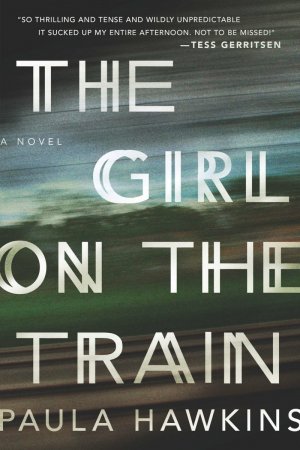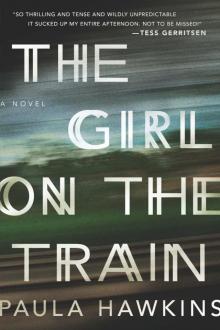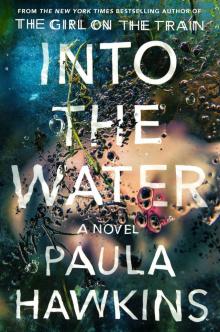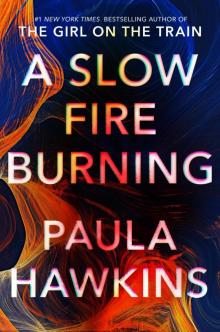- Home
- Paula Hawkins
The Girl on the Train Page 2
The Girl on the Train Read online
Page 2
Jess, with her bold prints and her Converse trainers and her beauty, her attitude, works in the fashion industry. Or perhaps in the music business, or in advertising—she might be a stylist or a photographer. She’s a good painter, too, plenty of artistic flair. I can see her now, in the spare room upstairs, music blaring, window open, a brush in her hand, an enormous canvas leaning against the wall. She’ll be there until midnight; Jason knows not to bother her when she’s working.
I can’t really see her, of course. I don’t know if she paints, or whether Jason has a great laugh, or whether Jess has beautiful cheekbones. I can’t see her bone structure from here and I’ve never heard Jason’s voice. I’ve never seen them up close, they didn’t live at that house when I lived down the road. They moved in after I left two years ago, I don’t know when exactly. I suppose I started noticing them about a year ago, and gradually, as the months went past, they became important to me.
I don’t know their names, either, so I had to name them myself. Jason, because he’s handsome in a British film star kind of way, not a Depp or a Pitt, but a Firth, or a Jason Isaacs. And Jess just goes with Jason, and it goes with her. It fits her, pretty and carefree as she is. They’re a match, they’re a set. They’re happy, I can tell. They’re what I used to be, they’re Tom and me five years ago. They’re what I lost, they’re everything I want to be.
EVENING
My shirt, uncomfortably tight, buttons straining across my chest, is pit-stained, damp patches clammy beneath my arms. My eyes and throat itch. This evening I don’t want the journey to stretch out; I long to get home, to undress and get into the shower, to be where no one can look at me.
I look at the man in the seat opposite mine. He is about my age, early to midthirties, with dark hair, greying at the temples. Sallow skin. He’s wearing a suit, but he’s taken the jacket off and slung it on the seat next to him. He has a MacBook, paper-thin, open in front of him. He’s a slow typist. He’s wearing a silver watch with a large face on his right wrist—it looks expensive, a Breitling maybe. He’s chewing the inside of his cheek. Perhaps he’s nervous. Or just thinking deeply. Writing an important email to a colleague at the office in New York, or a carefully worded break-up message to his girlfriend. He looks up suddenly and meets my eye; his glance travels over me, over the little bottle of wine on the table in front of me. He looks away. There’s something about the set of his mouth that suggests distaste. He finds me distasteful.
I am not the girl I used to be. I am no longer desirable, I’m off-putting in some way. It’s not just that I’ve put on weight, or that my face is puffy from the drinking and the lack of sleep; it’s as if people can see the damage written all over me, can see it in my face, the way I hold myself, the way I move.
One night last week, when I left my room to get myself a glass of water, I overheard Cathy talking to Damien, her boyfriend, in the living room. I stood in the hallway and listened. “She’s lonely,” Cathy was saying. “I really worry about her. It doesn’t help, her being alone all the time.” Then she said, “Isn’t there someone from work, maybe, or the rugby club?” and Damien said, “For Rachel? Not being funny, Cath, but I’m not sure I know anyone that desperate.”
THURSDAY, JULY 11, 2013
MORNING
I’m picking at the plaster on my forefinger. It’s damp, it got wet when I was washing out my coffee mug this morning; it feels clammy, dirty, though it was clean on this morning. I don’t want to take it off because the cut is deep. Cathy was out when I got home, so I went to the off-licence and bought two bottles of wine. I drank the first one and then I thought I’d take advantage of the fact that she was out and cook myself a steak, make a red-onion relish, have it with a green salad. A good, healthy meal. I sliced through the top of my finger while chopping the onions. I must have gone to the bathroom to clean it up and gone to lie down for a while and just forgotten all about it, because I woke up around ten and I could hear Cathy and Damien talking and he was saying how disgusting it was that I would leave the kitchen like that. Cathy came upstairs to see me, she knocked softly on my door and opened it a fraction. She cocked her head to one side and asked if I was OK. I apologized without being sure what I was apologizing for. She said it was all right, but would I mind cleaning up a bit? There was blood on the chopping board, the room smelled of raw meat, the steak was still sitting out on the countertop, turning grey. Damien didn’t even say hello, he just shook his head when he saw me and went upstairs to Cathy’s bedroom.
After they’d both gone to bed I remembered that I hadn’t drunk the second bottle, so I opened that. I sat on the sofa and watched television with the sound turned down really low so they wouldn’t hear it. I can’t remember what I was watching, but at some point I must have felt lonely, or happy, or something, because I wanted to talk to someone. The need for contact must have been overwhelming, and there was no one I could call except for Tom.
There’s no one I want to talk to except for Tom. The call log on my phone says I rang four times: at 11:02, 11:12, 11:54, 12:09. Judging from the length of the calls, I left two messages. He may even have picked up, but I don’t remember talking to him. I remember leaving the first message; I think I just asked him to call me. That may be what I said in both of them, which isn’t too bad.
The train shudders to a standstill at the red signal and I look up. Jess is sitting on her patio, drinking a cup of coffee. She has her feet up against the table and her head back, sunning herself. Behind her, I think I can see a shadow, someone moving: Jason. I long to see him, to catch a glimpse of his handsome face. I want him to come outside, to stand behind her the way he does, to kiss the top of her head.
He doesn’t come out, and her head falls forward. There is something about the way she is moving today that seems different; she is heavier, weighed down. I will him to come out to her, but the train jolts and slogs forward and still there is no sign of him; she’s alone. And now, without thinking, I find myself looking directly into my house, and I can’t look away. The French doors are flung open, light streaming into the kitchen. I can’t tell, I really can’t, whether I’m seeing this or imagining it—is she there, at the sink, washing up? Is there a little girl sitting in one of those bouncy baby chairs up there on the kitchen table?
I close my eyes and let the darkness grow and spread until it morphs from a feeling of sadness into something worse: a memory, a flashback. I didn’t just ask him to call me back. I remember now, I was crying. I told him that I still loved him, that I always would. Please, Tom, please, I need to talk to you. I miss you. No no no no no no no.
I have to accept it, there’s no point trying to push it away. I’m going to feel terrible all day, it’s going to come in waves—stronger then weaker then stronger again—that twist in the pit of my stomach, the anguish of shame, the heat coming to my face, my eyes squeezed tight as though I could make it all disappear. And I’ll be telling myself all day, it’s not the worst thing, is it? It’s not the worst thing I’ve ever done, it’s not as if I fell over in public, or yelled at a stranger in the street. It’s not as if I humiliated my husband at a summer barbecue by shouting abuse at the wife of one of his friends. It’s not as if we got into a fight one night at home and I went for him with a golf club, taking a chunk out of the plaster in the hallway outside the bedroom. It’s not like going back to work after a three-hour lunch and staggering through the office, everyone looking, Martin Miles taking me to one side, I think you should probably go home, Rachel. I once read a book by a former alcoholic where she described giving oral sex to two different men, men she’d just met in a restaurant on a busy London high street. I read it and I thought, I’m not that bad. This is where the bar is set.
EVENING
I have been thinking about Jess all day, unable to focus on anything but what I saw this morning. What was it that made me think that something was wrong? I couldn’t possibly see her expression at that distance, but I felt when I
was looking at her that she was alone. More than alone—lonely. Perhaps she was—perhaps he’s away, gone to one of those hot countries he jets off to to save lives. And she misses him, and she worries, although she knows he has to go.
Of course she misses him, just as I do. He is kind and strong, everything a husband should be. And they are a partnership. I can see it, I know how they are. His strength, that protectiveness he radiates, it doesn’t mean she’s weak. She’s strong in other ways; she makes intellectual leaps that leave him openmouthed in admiration. She can cut to the nub of a problem, dissect and analyse it in the time it takes other people to say good morning. At parties, he often holds her hand, even though they’ve been together years. They respect each other, they don’t put each other down.
I feel exhausted this evening. I am sober, stone-cold. Some days I feel so bad that I have to drink; some days I feel so bad that I can’t. Today, the thought of alcohol turns my stomach. But sobriety on the evening train is a challenge, particularly now, in this heat. A film of sweat covers every inch of my skin, the inside of my mouth prickles, my eyes itch, mascara rubbed into their corners.
My phone buzzes in my handbag, making me jump. Two girls sitting across the carriage look at me and then at each other, with a sly exchange of smiles. I don’t know what they think of me, but I know it isn’t good. My heart is pounding in my chest as I reach for the phone. I know this will be nothing good, either: it will be Cathy, perhaps, asking me ever so nicely to maybe give the booze a rest this evening? Or my mother, telling me that she’ll be in London next week, she’ll drop by the office, we can go for lunch. I look at the screen. It’s Tom. I hesitate for just a second and then I answer it.
“Rachel?”
For the first five years I knew him, I was never Rachel, always Rach. Sometimes Shelley, because he knew I hated it and it made him laugh to watch me twitch with irritation and then giggle because I couldn’t help but join in when he was laughing. “Rachel, it’s me.” His voice is leaden, he sounds worn out. “Listen, you have to stop this, OK?” I don’t say anything. The train is slowing, and we are almost opposite the house, my old house. I want to say to him, Come outside, go and stand on the lawn. Let me see you. “Please, Rachel, you can’t call me like this all the time. You’ve got to sort yourself out.” There is a lump in my throat as hard as a pebble, smooth and obstinate. I cannot swallow. I cannot speak. “Rachel? Are you there? I know things aren’t good with you, and I’m sorry for you, I really am, but . . . I can’t help you, and these constant calls are really upsetting Anna. OK? I can’t help you anymore. Go to AA or something. Please, Rachel. Go to an AA meeting after work today.”
I pull the filthy plaster off the end of my finger and look at the pale, wrinkled flesh beneath, dried blood caked at the edge of my fingernail. I press the thumbnail of my right hand into the centre of the cut and feel it open up, the pain sharp and hot. I catch my breath. Blood starts to ooze from the wound. The girls on the other side of the carriage are watching me, their faces blank.
MEGAN
• • •
One year earlier
WEDNESDAY, MAY 16, 2012
MORNING
I can hear the train coming; I know its rhythm by heart. It picks up speed as it accelerates out of Northcote station and then, after rattling round the bend, it starts to slow down, from a rattle to a rumble, and then sometimes a screech of brakes as it stops at the signal a couple hundred yards from the house. My coffee is cold on the table, but I’m too deliciously warm and lazy to bother getting up to make myself another cup.
Sometimes I don’t even watch the trains go past, I just listen. Sitting here in the morning, eyes closed and the hot sun orange on my eyelids, I could be anywhere. I could be in the south of Spain, at the beach; I could be in Italy, the Cinque Terre, all those pretty coloured houses and the trains ferrying the tourists back and forth. I could be back in Holkham, with the screech of gulls in my ears and salt on my tongue and a ghost train passing on the rusted track half a mile away.
The train isn’t stopping today, it trundles slowly past. I can hear the wheels clacking over the points, can almost feel it rocking. I can’t see the faces of the passengers and I know they’re just commuters heading to Euston to sit behind desks, but I can dream: of more exotic journeys, of adventures at the end of the line and beyond. In my head, I keep travelling back to Holkham; it’s odd that I still think of it, on mornings like this, with such affection, such longing, but I do. The wind in the grass, the big slate sky over the dunes, the house infested with mice and falling down, full of candles and dirt and music. It’s like a dream to me now.
I feel my heart beating just a little too fast.
I can hear his footfall on the stairs, he calls my name.
“You want another coffee, Megs?”
The spell is broken, I’m awake.
EVENING
I’m cool from the breeze and warm from the two fingers of vodka in my martini. I’m out on the terrace, waiting for Scott to come home. I’m going to persuade him to take me out to dinner at the Italian on Kingly Road. We haven’t been out for bloody ages.
I haven’t got much done today. I was supposed to sort out my application for the fabrics course at St. Martins; I did start it, I was working downstairs in the kitchen when I heard a woman screaming, making a horrible noise, I thought someone was being murdered. I ran outside into the garden, but I couldn’t see anything.
I could still hear her, though, it was nasty, it went right through me, her voice really shrill and desperate. “What are you doing? What are you doing with her? Give her to me, give her to me.” It seemed to go on and on, though it probably only lasted a few seconds.
I ran upstairs and climbed out onto the terrace and I could see, through the trees, two women down by the fence a few gardens over. One of them was crying—maybe they both were—and there was a child bawling its head off, too.
I thought about calling the police, but it all seemed to calm down then. The woman who’d been screaming ran into the house, carrying the baby. The other one stayed out there. She ran up towards the house, she stumbled and got to her feet and then just sort of wandered round the garden in circles. Really weird. God knows what was going on. But it’s the most excitement I’ve had in weeks.
My days feel empty now I don’t have the gallery to go to any longer. I really miss it. I miss talking to the artists. I even miss dealing with all those tedious yummy mummies who used to drop by, Starbucks in hand, to gawk at the pictures, telling their friends that little Jessie did better pictures than that at nursery school.
Sometimes I feel like seeing if I can track down anybody from the old days, but then I think, what would I talk to them about now? They wouldn’t even recognize Megan the happily married suburbanite. In any case, I can’t risk looking backwards, it’s always a bad idea. I’ll wait until the summer is over, then I’ll look for work. It seems like a shame to waste these long summer days. I’ll find something, here or elsewhere, I know I will.
TUESDAY, AUGUST 14, 2012
MORNING
I find myself standing in front of my wardrobe, staring for the hundredth time at a rack of pretty clothes, the perfect wardrobe for the manager of a small but cutting-edge art gallery. Nothing in it says “nanny.” God, even the word makes me want to gag. I put on jeans and a T-shirt, scrape my hair back. I don’t even bother putting on any makeup. There’s no point, is there, prettying myself up to spend all day with a baby?
I flounce downstairs, half spoiling for a fight. Scott’s making coffee in the kitchen. He turns to me with a grin, and my mood lifts instantly. I rearrange my pout to a smile. He hands me a coffee and kisses me.
There’s no sense blaming him for this, it was my idea. I volunteered to do it, to become a childminder for the people down the road. At the time, I thought it might be fun. Completely insane, really, I must have been mad. Bored, mad, curious. I wanted to see. I
think I got the idea after I heard her yelling out in the garden and I wanted to know what was going on. Not that I’ve asked, of course. You can’t really, can you?
Scott encouraged me—he was over the moon when I suggested it. He thinks spending time around babies will make me broody. In fact, it’s doing exactly the opposite; when I leave their house I run home, can’t wait to strip my clothes off and get into the shower and wash the baby smell off me.
I long for my days at the gallery, prettied up, hair done, talking to adults about art or films or nothing at all. Nothing at all would be a step up from my conversations with Anna. God, she’s dull! You get the feeling that she probably had something to say for herself once upon a time, but now everything is about the child: Is she warm enough? Is she too warm? How much milk did she take? And she’s always there, so most of the time I feel like a spare part. My job is to watch the child while Anna rests, to give her a break. A break from what, exactly? She’s weirdly nervous, too. I’m constantly aware of her, hovering, twitching. She flinches every time a train passes, jumps when the phone rings. “They’re just so fragile, aren’t they?” she says, and I can’t disagree with that.
I leave the house and walk, leaden-legged, the fifty yards along Blenheim Road to their house. No skip in my step. Today, she doesn’t open the door, it’s him, the husband. Tom, suited and booted, off to work. He looks handsome in his suit—not Scott handsome, he’s smaller and paler, and his eyes are a little too close together when you see him up close, but he’s not bad. He flashes me his wide, Tom Cruise smile, and then he’s gone, and it’s just me and her and the baby.

 Girl on the Train
Girl on the Train The Girl on the Train
The Girl on the Train Into the Water
Into the Water A Slow Fire Burning
A Slow Fire Burning